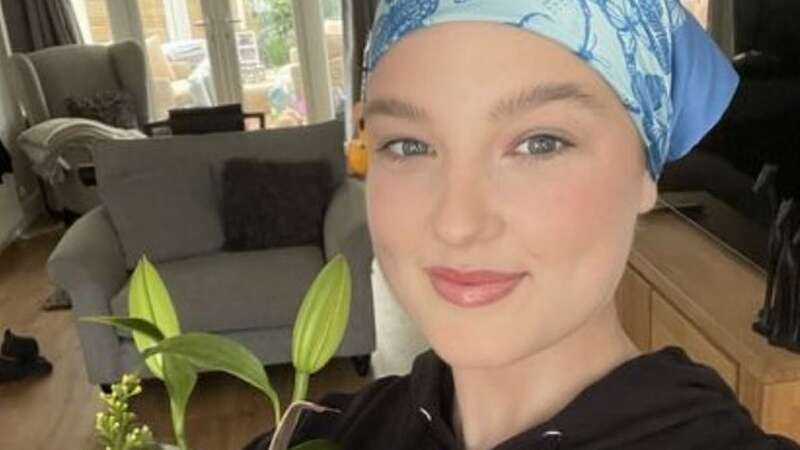
A young dancer who thought her fatigue and headaches were caused by 5-hour long practice sessions was horrified to find she was actually suffering from advanced cancer.
Libby Sunter, 20, began experiencing head pain, extreme fatigue and blackouts while studying musical theatre at Leeds University, where she would dance several hours a day. But after a sudden seizure, she was rushed to A&E and told she was simply suffering from anaemia – despite multiple blood tests, scans, and a spinal tap to check for meningitis. Libby continued feeling poorly, forcing her to return to her family home in Childwall.
It wasn't until she became seriously unwell and could barely stand that she was given the devastating news that she had stage 4 Hodgkin lymphoma. She said: "I was really, really ill at home. I wasn't eating. I couldn't get out of bed. And then I had a really high temp and went straight back to A&E. By the time I went back into A&E I couldn't even stand by myself. My mum and dad were holding me up.
"They got me straight through onto a bed and went over all the notes from Leeds, and within a matter of days they were discussing the possibility of lymphoma. I was in for about 10 or 11 days, and within a week I had a biopsy and was given the diagnosis not long after."
 Libby, then 18, was diagnosed with stage 4 Hodgkin lymphoma (Liverpool Echo)
Libby, then 18, was diagnosed with stage 4 Hodgkin lymphoma (Liverpool Echo) The student was rushed to A&E when she became seriously unwell and could barely stand (Liverpool Echo)
The student was rushed to A&E when she became seriously unwell and could barely stand (Liverpool Echo)Libby, who was just 18 at the time, was diagnosed with stage 4 Hodgkin lymphoma - an uncommon cancer that develops in the lymphatic system. She said: "I think the biggest shock was, I thought I was very healthy. It was so unexpected. Even the symptoms I was having I completely brushed off and didn't even think they could be linked to anything as serious as what it was."
 Brit 'saw her insides' after being cut open by propeller on luxury diving trip
Brit 'saw her insides' after being cut open by propeller on luxury diving trip
"I was just in shock for so long and I didn't know how to process it. I thought 'surely not me. There's no way this is happening'. Because it was stage 4, it was much more terrifying because your mind goes to the worst outcome. It was horrendous really."
After seven months of chemotherapy at the Clatterbridge Cancer Centre, Libby received the good news that her cancer was in remission in November 2022. It remains in remission today, and she still has regular check-ups to keep an eye on her condition.
The 20-year-old is now keen to resume her studies in musical theatre after the devastating diagnosis previously thwarted her plans. Libby said: "My mum and dad are like my best friends. I'm the youngest one in the family. We were so upset because we knew I wouldn't be able to do any of the things I wanted to do before I was diagnosed, because of how much it would affect me."
"I would never go to chemo alone. I would always have people with me. I wouldn't have got through it without them. I'm still completely in remission. I had a scan recently as a check-up and had a full review from the doctors. I'll be kept on the system for three years, so after the three years the likelihood of relapse is tiny."
She added: "I remember starting it off trying to be as positive as I could, because you're given the cards you're dealt and there was nothing I could do to change it. But there were definitely moments where, because of how horrid the chemo side effects were, I would go days stuck at home unable to do anything."
"That was when it was mentally the hardest. Losing my hair was a huge thing. I shaved it off early on because I didn't want to watch it falling out on my pillow every day. I found a lot of people within the cancer community who were going through the same thing so that really helped. Because of how close I was to my family, my girlfriend, and Clatterbridge, the support system I had was amazing."
Libby is now supporting the Clatterbridge Cancer Centre’s Dove Appeal – which raises money to fund life-saving research, technology, and arts programmes to support patients undergoing treatment. She said: "The support that I received from everyone in my life, but specifically from Clatterbridge, was incredible. It's such a beautiful hospital. They just made me feel so at ease and so weirdly, really calm about everything that I was going through. The nurses were just angels."
"They became like family. There was always someone there to talk to. They always did trips for us and stuff, like, we went to zoo together and we did an escape room, we went for meals. And I am in a specific teenage and young adult unit, so everyone that was getting treatment was roughly my age, which helped so much. Even if you didn't really speak to them, you just kind of knew that everyone understood what each other were going through."
Read more similar news:
Comments:
comments powered by Disqus
































